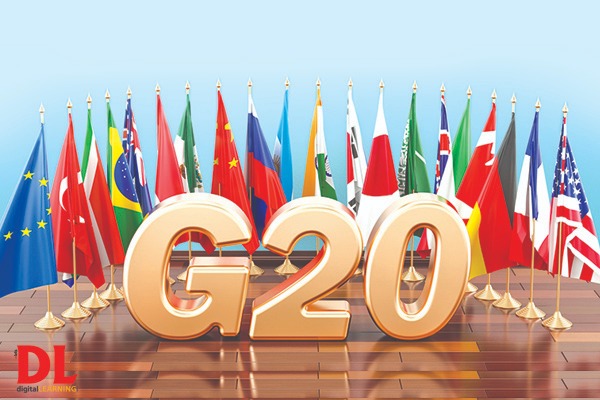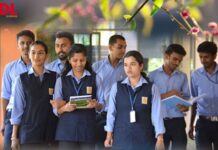
The realm of education is currently experiencing substantial changes, primarily driven by technological advancements and, significantly, through international partnerships among countries. The recently concluded G20 summit serves as a significant milestone in these global collaborative efforts, encompassing not only education but also various other sectors. It’s worth noting that the G20 nations, collectively responsible for 85% of the world’s Gross Domestic Product (GDP) and 75% of global trade, play an indispensable role in the global economy.
In 1999, when the G20 countries first came together, their primary focus was achieving international financial stability. Over the years, as the G20 gained prominence, its agenda expanded to address various critical issues, including education. Recognising that education is a fundamental driver of economic growth and development, the G20 has consistently stressed that education is pivotal to achieving not only the Sustainable Development Goals (SDGs) but also many other important objectives.
The significance of education as an agenda gained momentum during the 2018 G20 meeting in Argentina when it was incorporated into the Sherpa Track. This development led to the establishment of the Education Working Group (EdWG), which convenes three to four times a year.
Under the leadership of past G20 presidencies, the Education Working Groups have focused on strengthening educational systems to make them more inclusive, accessible, and innovative. Topics such as educational poverty, the importance of universal quality education, ensuring continuity of learning during crises, and supporting teachers have been discussed extensively. The EdWG has also delved into the use of technology to ensure educational continuity and universal access, addressing challenges related to the digital divide, its impact on early learners, as well as issues concerning data privacy, cyber safety, and responsible technology use. Previous presidencies have also tackled issues related to the evolving nature of work and the necessity to enhance education and skill development to adapt to these changes.
As India assumes the presidency of the G20 summit this year, its primary goal is to collaborate with G20 countries to bridge gaps in quality education and skill development. Additionally, India aims to foster cooperation with universities worldwide to enhance technology-enabled learning, further advancing the global education agenda.
UNESCO’s G20 Expectation – Education Perspective
The United Nations Educational, Scientific and Cultural Organization (UNESCO) is dedicated to advancing global peace and security by fostering international collaboration in education, arts, sciences, and culture. In pursuit of this vision, UNESCO plays a significant role in monitoring and participating in global education initiatives, including those occurring through international platforms like the G20. One of the key endeavors aimed at promoting quality and accessible education is the Education Working Group (EWG), established in 2018 during Argentina’s G20 Presidency. The EWG’s focus areas include skills for life and work, as well as the financing of education, and UNESCO has been actively supporting these efforts by advocating for policies that shape the future of education, life, and work.
The United Nations Educational, Scientific and Cultural Organization (UNESCO) is dedicated to advancing global peace and security by fostering international collaboration in education, arts, sciences, and culture. In pursuit of this vision, UNESCO plays a significant role in monitoring and participating in global education initiatives, including those occurring through international platforms like the G20. One of the key endeavors aimed at promoting quality and accessible education is the Education Working Group (EWG), established in 2018 during Argentina’s G20 Presidency. The EWG’s focus areas include skills for life and work, as well as the financing of education, and UNESCO has been actively supporting these efforts by advocating for policies that shape the future of education, life, and work.
Under the Indian Presidency of the G20’s Education Working Group this year, the guiding principle is “Vasudhaiva Kutumbakam – One Earth, One Family, One Future through Education.” This reflects the recognition that in a world facing significant challenges, solidarity and partnerships are essential to equip every learner with the knowledge, skills, and values needed to create a better future for themselves and society at large.
The G20 Education Working Group’s latest report and compendium offer a comprehensive analysis of promising practices and policies, showcasing the commitment of G20 and participating countries to drive transformation in education. These documents are the result of ongoing guidance and support from the G20 Education Working Group, as well as the dedicated efforts of the Indian Presidency G20 team, Tata Institute of Social Sciences (TISS), OECD, UNICEF, and UNESCO teams.
The G20 Education Working Group has centered its efforts on four primary themes:
- Ensuring foundational literacy and numeracy and harnessing digital technology.
- Strengthening the relevance and connections between education and the future of work.
- Promoting collaboration between higher education and research.
- Encouraging development and innovation within and across national boundaries.
Throughout, the emphasis remains on lifelong learning, with a focus on inclusive, high-quality, and equitable education for all.
The report introduces the “5 C’s framework” for unlocking inclusive, qualitative, collaborative tech-enabled learning. These five keys are Coordination and leadership, content and curriculum, connectivity and infrastructure, capacity and culture, and cost and sustainability, all underpinned by the need for accurate and timely data across these dimensions.
The G20 Education Working Group also addressed the challenges and opportunities presented by lifelong learning and the evolving landscape of work, particularly in the context of Artificial Intelligence (AI). The global AI in education market is experiencing rapid growth, driven by increased investments in AI and EdTech, the rise of edutainment, and advancements in technology. Countries are preparing to adapt to these changes by expanding postsecondary education, diversifying Technical and Vocational Education and Training (TVET) opportunities, and examining skills development and recognition systems.
Furthermore, G20 countries are reevaluating their strategies to support higher education research, especially in critical areas such as energy, health, and climate change, to address present and future challenges effectively.
Significance of G20 in India’s Education Upliftment
India is making remarkable strides in the realm of educational transformation. Whether it’s the National Education Policy 2020, which garnered international acclaim, or the initiative to welcome foreign universities to establish campuses within India, the country is actively embracing all opportunities that have the potential to elevate the current educational landscape.
The same was witnessed when Prime Minister Narendra Modi and the Union Minister for Education have emphasised the significance of the G20 platform as an opportunity for India to showcase its leadership in the field of educational technology (edtech) and demonstrate the substantial progress made in digital education. During the G20 Summit, India intends to emphasise the achievements made under the National Education Policy (NEP) of 2020, which places a strong emphasis on the role of technology in improving educational outcomes and presents a new educational paradigm to the global community.
This new paradigm has the potential to serve as a global model, particularly for emerging economies.
India is setting an exemplary precedent by showcasing a firm commitment to technology-driven education through robust public policies, a visionary approach, and adequate financial support. Such commitment is pivotal for achieving any goals related to inclusive education. The current government’s dedication to harnessing digital innovations to promote inclusivity in education is exemplified by the recent launch of the G20-Digital Innovation Alliance (DIA). The DIA is aimed at fostering innovative solutions and bringing together a coalition of players from the innovation ecosystem, including startups, investors, mentors, and institutions, all of whom are actively contributing to the development of digital public goods and innovations to advance economies and uplift societies.
This initiative encompasses startups that are working on edtech solutions and various other endeavors that amalgamate technology and education towards a shared objective of fostering development. Additionally, India’s education regulatory authorities, such as AICTE and UGC, have already put several similar initiatives into action, further driving the synergy between technology and education for developmental purposes.
End Note!
Mahatma Gandhi once articulated, “When I refer to education, I mean the holistic cultivation of the best qualities in a child or an individual— nurturing their physical, mental, and spiritual facets. Literacy, in and of itself, is not the ultimate goal of education; it’s not even the initial step. Instead, it’s just one of the tools that enable individuals to become truly educated.”
In the year 2023, India holds a significant position on multiple fronts. Its role as the G20 Presidency offers a distinctive opportunity for India to leave its mark on the global education agenda, influencing the world’s trajectory towards achieving the Sustainable Development Goals (SDGs) and more.
India’s G20 presidency is not merely a milestone for education but also positions the country as an advocate for both developing and underdeveloped nations. To keep this momentum of change going for betterment of the world, Prime Minister Modi passed on the G20 presidential responsibilities to Brazilian President Lula with heartfelt gratitude and also expressed confidence in India’s successor to advance the causes of “Global Unity” and “Prosperity,” and bring major developments with the advancements in education.






















